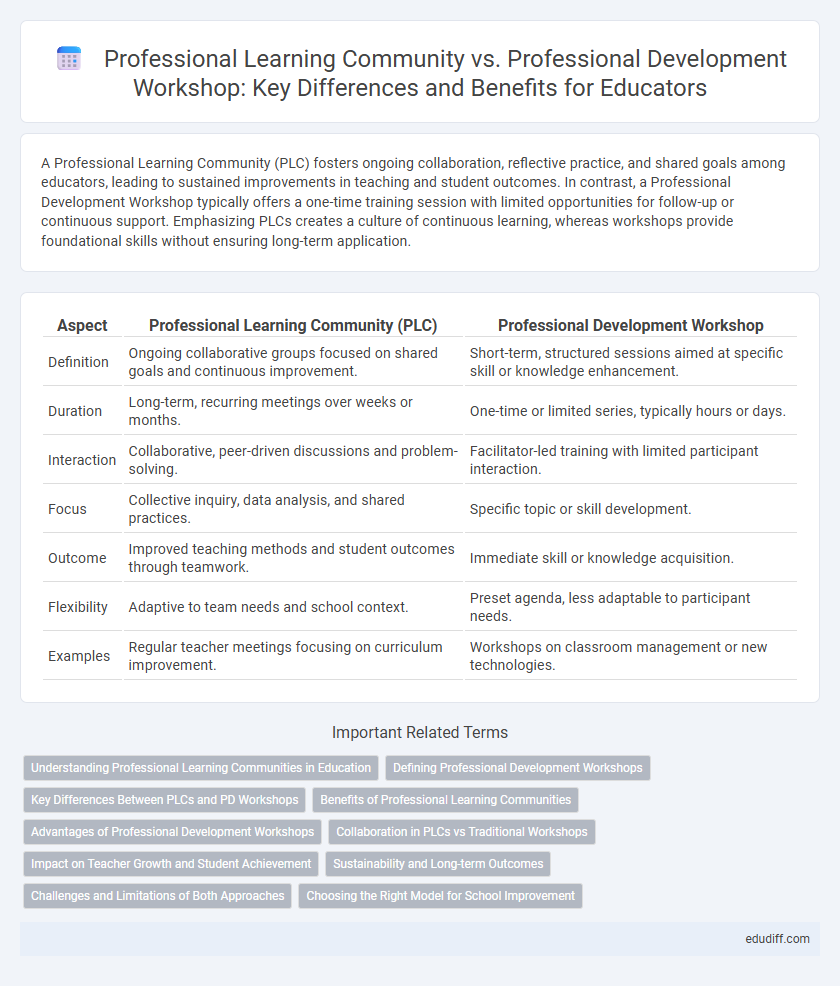A Professional Learning Community (PLC) fosters ongoing collaboration, reflective practice, and shared goals among educators, leading to sustained improvements in teaching and student outcomes. In contrast, a Professional Development Workshop typically offers a one-time training session with limited opportunities for follow-up or continuous support. Emphasizing PLCs creates a culture of continuous learning, whereas workshops provide foundational skills without ensuring long-term application.
Table of Comparison
| Aspect | Professional Learning Community (PLC) | Professional Development Workshop |
|---|---|---|
| Definition | Ongoing collaborative groups focused on shared goals and continuous improvement. | Short-term, structured sessions aimed at specific skill or knowledge enhancement. |
| Duration | Long-term, recurring meetings over weeks or months. | One-time or limited series, typically hours or days. |
| Interaction | Collaborative, peer-driven discussions and problem-solving. | Facilitator-led training with limited participant interaction. |
| Focus | Collective inquiry, data analysis, and shared practices. | Specific topic or skill development. |
| Outcome | Improved teaching methods and student outcomes through teamwork. | Immediate skill or knowledge acquisition. |
| Flexibility | Adaptive to team needs and school context. | Preset agenda, less adaptable to participant needs. |
| Examples | Regular teacher meetings focusing on curriculum improvement. | Workshops on classroom management or new technologies. |
Understanding Professional Learning Communities in Education
Professional Learning Communities (PLCs) in education emphasize continuous collaboration among educators to improve teaching practices through shared goals, data analysis, and collective responsibility for student learning. Unlike Professional Development Workshops, which typically provide one-time, expert-led sessions focused on acquiring specific skills or knowledge, PLCs foster ongoing dialogue and reflective practice within a school or district. Effective PLC implementation leads to sustained instructional improvement and increased student achievement by creating a culture of shared professional growth and accountability.
Defining Professional Development Workshops
Professional Development Workshops are structured training sessions designed to enhance specific skills or knowledge within a limited timeframe, often featuring expert-led presentations and hands-on activities. These workshops focus on short-term learning objectives and immediate application, contrasting with the ongoing, collaborative nature of Professional Learning Communities. Their targeted format supports efficient skill acquisition and addresses particular professional needs or challenges.
Key Differences Between PLCs and PD Workshops
Professional Learning Communities (PLCs) emphasize ongoing collaboration and collective inquiry among educators to improve teaching practices and student outcomes, while Professional Development (PD) Workshops typically provide one-time, expert-led training sessions focused on specific skills or knowledge. PLCs foster continuous reflection, shared responsibility, and sustained relationship-building, creating a cycle of improvement based on real classroom experiences. In contrast, PD Workshops often lack long-term engagement and may not offer opportunities for tailored feedback or collaborative problem-solving.
Benefits of Professional Learning Communities
Professional Learning Communities (PLCs) foster continuous collaboration among educators, leading to sustained improvements in teaching strategies and student outcomes. Unlike one-time Professional Development Workshops, PLCs provide ongoing support, shared accountability, and collective problem-solving, enhancing professional growth within a supportive environment. The collective expertise in PLCs drives data-informed decision-making, promoting a culture of reflective practice and innovation in education.
Advantages of Professional Development Workshops
Professional Development Workshops offer targeted skill enhancement through hands-on activities and real-time feedback, fostering immediate application of knowledge in the workplace. These workshops provide an intensive, time-efficient learning environment that can address specific challenges or emerging trends relevant to professionals. By facilitating collaboration among diverse participants, workshops enhance networking opportunities and promote the exchange of best practices across various sectors.
Collaboration in PLCs vs Traditional Workshops
Professional Learning Communities (PLCs) emphasize ongoing collaboration among educators to improve teaching practices and student outcomes through shared goals and collective problem-solving. In contrast, traditional Professional Development Workshops often involve passive, one-time sessions with limited interaction, focusing more on individual learning. The collaborative nature of PLCs fosters sustained engagement and practical implementation, leading to deeper professional growth compared to the isolated experience of workshops.
Impact on Teacher Growth and Student Achievement
Professional Learning Communities (PLCs) foster ongoing collaborative inquiry among educators, leading to sustained teacher growth and higher student achievement through shared best practices and collective problem-solving. In contrast, Professional Development Workshops typically offer one-time, expert-led sessions that provide immediate knowledge or skills but may lack long-term impact without follow-up support. Research shows that PLCs have a stronger correlation with improved instructional quality and student outcomes due to their continuous, reflective nature.
Sustainability and Long-term Outcomes
Professional Learning Communities (PLCs) foster ongoing collaboration among educators, promoting sustained growth through continuous reflection and shared best practices, which enhances long-term teaching effectiveness and student outcomes. In contrast, Professional Development Workshops often provide one-time training sessions that may lack follow-up and integration into daily practice, limiting their impact on sustainable improvement. Emphasizing PLCs aligns with educational sustainability goals by embedding professional growth into school culture, ensuring enduring benefits beyond immediate workshop content.
Challenges and Limitations of Both Approaches
Professional Learning Communities (PLCs) often face challenges such as inconsistent participation, time constraints, and difficulty sustaining long-term engagement among educators. Professional Development Workshops frequently suffer from limitations including one-size-fits-all content, limited follow-up support, and a lack of contextual relevance to specific classroom environments. Both approaches may struggle to effectively measure impact on teaching practices and student learning outcomes, hindering continuous improvement efforts.
Choosing the Right Model for School Improvement
Professional Learning Communities (PLCs) foster ongoing collaboration among educators to continuously analyze student data and implement targeted instructional strategies, driving sustainable school improvement. Professional Development Workshops provide focused, time-limited training sessions to enhance specific skills or knowledge but often lack the continuity for long-term change. Selecting the right model depends on a school's commitment to culture change and capacity for collaborative practice versus immediate skill acquisition.
Professional Learning Community vs Professional Development Workshop Infographic

 edudiff.com
edudiff.com